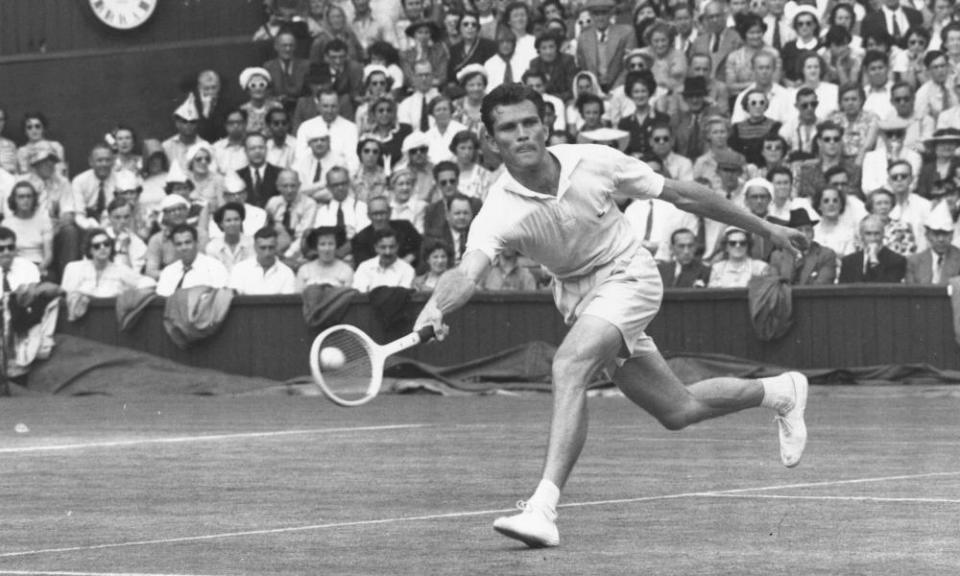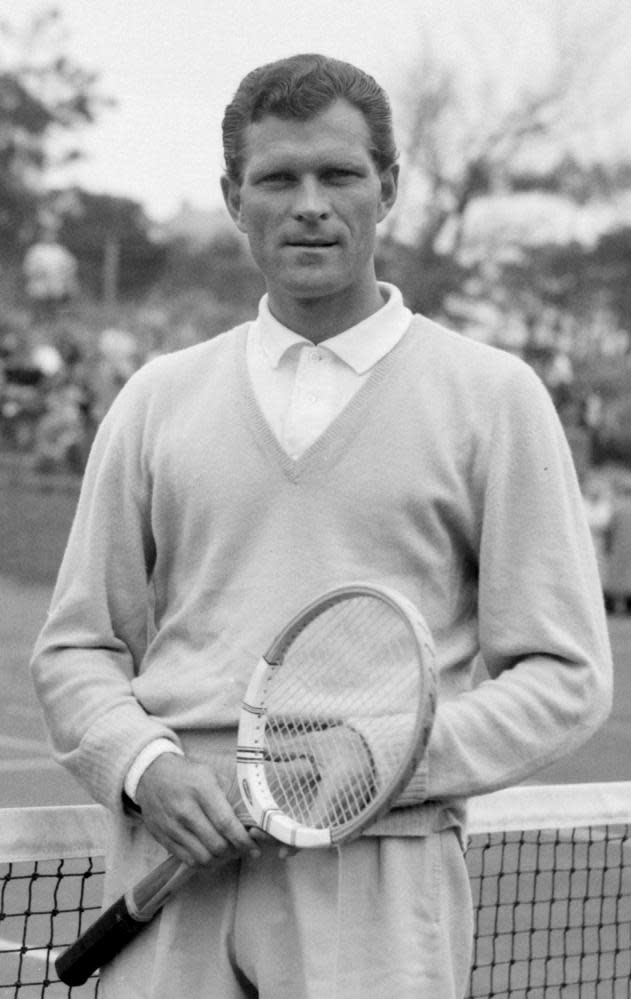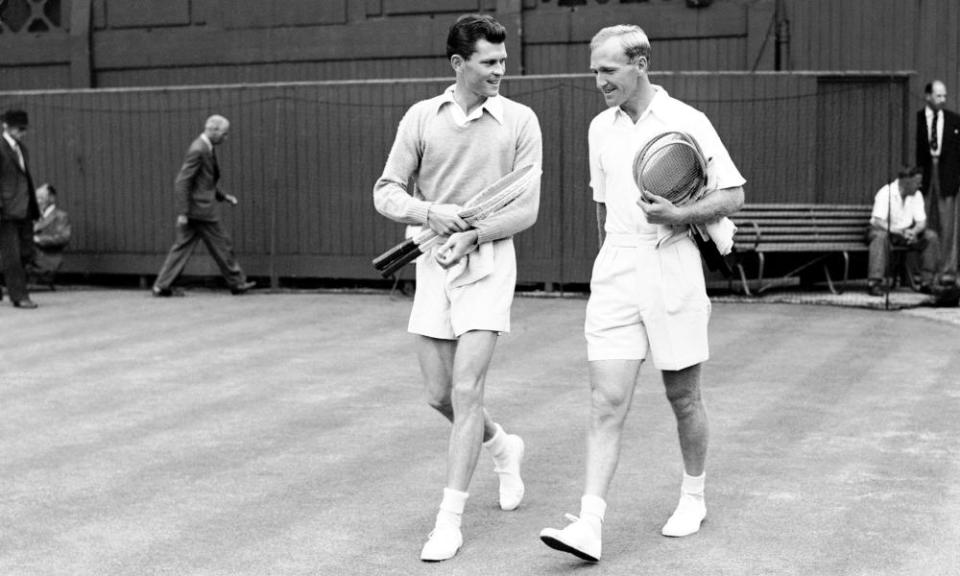Budge Patty obituary

In 1950 the US tennis star Budge Patty, who has died aged 97, gained the men’s singles titles at both the French Open championship and at Wimbledon – a double win that is still a rare achievement for any American player. He ended that year ranked No 1 in the world and proved himself the best, most elegant forehand volleyer of his era. All this while the Czech exile Jaroslav Drobný and the great Australian Frank Sedgman were the dominant players of the day and at their peak.
It was Patty’s fate to be involved in many gruelling contests, including what was then the longest singles match in Wimbledon history, against Drobný in 1953. The year before, Drobný, that year’s French champion, had become Patty’s doubles partner, and they had reached the Wimbledon semi-finals. Yet their partnership was put under strain by the struggles they experienced when playing in singles against each other. They were so well matched that their contests were punitive. One match in Lyon was halted by officials after Patty and Drobný had played 100 games without finishing the third set.
In the 1953 Wimbledon men’s singles, an unseeded Patty and fourth-seeded Drobný met in the third round. In the third set, after 57 games, Patty was just one point from a two-set lead. He blew it. Drobný took the set, and then the fourth, 8-6. Both men had strained muscles and cramp. Players did not even have seats between changeovers in those days. Patty now drank brandy to revive himself.

The final set began with an eerie silence on centre court. Patty was 6-5 up, had three more match points, and lost them all. At 8-8, Drobný protested that the light was gone. The referee ordered them to play on, but at 10-10 declared that just two more games would be played.
Drobný somehow took Patty’s service game and then held his own, both to love. The final score was 8-6, 16-18, 3-6, 8-6, 12-10. Patty had had six match points, and lost the match after 93 games and four hours 23 minutes. He had won one game fewer than Drobný. Patty was heroic in defeat, but it was a defeat his mind must have replayed again and again. He and Drobný were never doubles partners again.
John Patty was born in Fort Smith, Arkansas, but he and his family moved to Los Angeles when he was four months old. A stolid toddler, he collected his nickname from his mother and older brother repeatedly saying “Hey, budge!” to goad him to action. Attending Los Angeles high school, he grew up with a film star’s good looks and a taste for sophisticated society that Europe would soon satisfy.
He joined the wartime US army and landed in North Africa in February 1944. After Algiers he was stationed in Italy, but it was in France, as an unremarked private, first class, that his talent for tennis brought him some attention. At the second world war’s end, after being in Paris to witness its liberation, he entered an allied forces tournament in Marseille and won.
His progress was rapid and, at the first postwar Wimbledon in 1946, unseeded and 22 years old, he reached the last 16. He returned the following year, again unseeded, to beat the No 2 seed, the Australian John Bromwich, and the No 6, Drobný, before losing in the semi-finals to Tom Brown. In 1948 he was seeded sixth and lost to Bromwich in the quarter-finals.
He enjoyed some doubles success in these years too. In 1946 he reached the Wimbledon semi-finals with Pancho Segura and the semis of the mixed doubles with Pauline Betz, with whom he also won the French mixed doubles. In 1949 he reached the men’s doubles final at the French and the semis at Wimbledon. By then he had settled in Paris, in a flat overlooking the Seine.

There was no doubting Patty’s artistry and impeccable timing. His commitment, however, was another matter. It was said that he sacrificed morning training to the rigours of his nightlife. In late 1949, however, he gave up smoking and alcohol for the sake of his tennis, after becoming runner-up in France and ending the year ranked among the world’s top 10.
In 1950, his new self-discipline was rewarded. The fifth seed at Wimbledon, he knocked out the No 2 Bill Talbert in the quarter-finals, the 12th seed Vic Seixas in the semis and then beat the No 1, Sedgman, in the final. Patty was a favourite with British crowds and his victory was greeted with rapture. Patty beat Drobný to win the French championship and become world No 1.
He played little in the US, though he was a member of the Davis Cup team of 1951. At Wimbledon that year, seeded fourth, the highest placing he ever achieved, he suffered an unexpected defeat in the second round, going out after a five-set struggle to his doubles partner of that year, the unseeded Ham Richardson, another American. They then lost to Ken McGregor and Sedgman in the men’s doubles.
Patty won the Italian championship in 1954; he was back to being seeded fourth at Wimbledon in 1956, after reaching the semi-finals in both previous years; and in 1957 he won at Wimbledon in the men’s doubles, partnered by Gardnar Mulloy. Mulloy was 43 and Patty 33, but they beat Lew Hoad and Neale Fraser in their prime.
In 1960 Patty played his last Wimbledon singles, losing to Nicola Pietrangeli in the first round; 1961 saw his final appearances in the doubles.
He had lived in Paris all through these years, moving as easily in cafe society as around the tennis circuits. In 1960 he moved to Switzerland and the following year married Maria Marcina Sfezzo.
He went into business, first for his father-in-law, the Brazilian industrialist Constantin Sfezzo and later in real estate. After retirement at 65, he continued to attend grand slam tennis events in Europe.
He is survived by his wife and their two daughters, Christine and Elaine.
• Budge (John Edward) Patty, tennis player, born 11 February 1924; died 3 October 2021

 Yahoo Sport
Yahoo Sport 





































